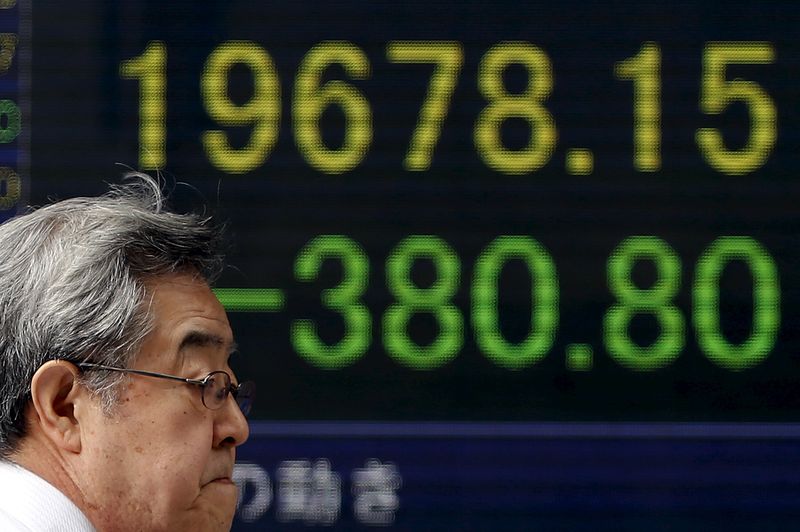By Gina Lee
Investing.com – Asia Pacific stocks were down on Thursday morning, extending a fall in U.S. counterparts. U.S. equity futures also retreated as fears of an economic downturn grow and investors turned to safe havens including sovereign bonds.
Japan’s Nikkei 225 fell 2.44% by 10:31 PM ET (2:31 AM GMT), with trade data for April 2022 showing that exports rose 12.5% year-on-year, imports rose 28.2% year-on-year, and the trade balance contracted to -JPY839.2 billion (-$6.51 billion).
South Korea’s KOSPI fell 1.60%.
In Australia, the ASX 200 fell 1.59%. Employment data showed that the employment change was 4,000 in April 2022, the full employment change was 92,400 and the unemployment rate was 3.9%.
Hong Kong’s Hang Seng Index slid 3.47%.
China’s Shanghai Composite was down 0.96% and the Shenzhen Component fell 1.20%.
Stocks in the region were impacted by the S&P 500 index’s 4% fall during the previous session, the biggest fall in almost two years. The Nasdaq 100 index also tumbled more than 5%.
The latest company earnings reports also drove worries that high inflation is weighing on both margins and consumer spending. Target Corp. (NYSE:TGT) shares plunged the most since Black Monday in 1987, just a day after Walmart Inc. (NYSE:WMT) also saw its shares drop. Cisco Systems Inc. (NASDAQ:CSCO) shares fell in extended trading as its revenue outlook disappointed.
U.S. Federal Reserve policymakers maintained a hawkish tone, with Chicago Fed President Charles Evans saying hiking interest rates somewhat above the neutral level and stopping there should help bring inflation down. Treasuries climbed due to the reduced risk appetite, with bonds in Australia and New Zealand also on an upward trend.
China’s ongoing COVID-19 lockdowns are also impacting markets, and Tencent Holdings (OTC:TCEHY) Ltd. (HK:0700) said it will take time for authorities to act on promises to prop up the Chinese tech sector. However, Premier Li Keqiang said China has enough policy room to deal with the growing challenges facing the economy.
In commodities, oil fell below the $109 mark over fuel demand concerns.
The challenge posed by inflation for bellwether retailers is weakening the argument that positive corporate earnings could curb the rout in stocks in 2022 to date. Concerns that global equities are headed towards a bear market are also growing.
“We are pricing in a growth scare,” RBC (TSX:RY) Capital Markets’ Lori Calvasina told Bloomberg.
“The market is trying to find a bottom here. There is a lot of uncertainty in this market right now about whether or not that recession is going to come through or if it’s going to be another near-death experience.”
Meanwhile, it is unlikely the U.S. will allow Russia to continue making bond payments on its foreign-currency debt, according to U.S. Treasury Secretary Janet Yellen. Investors have had time to adjust to Russia's exclusion from the global financial system for instigating the war in Ukraine, she added.
